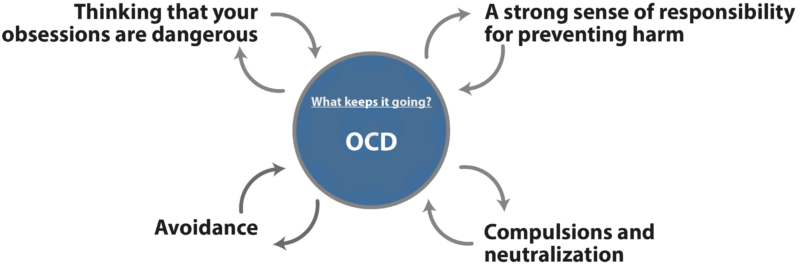There may be new hope on the horizon for people with OCD. A new experimental treatment has been shown to be effective in reducing symptoms in a majority of patients. The treatment is a type of cognitive behavioral therapy, and it involves exposure and response prevention.
Contents
What Is Experimental OCD Treatment?

Experimental OCD treatment is a type of therapy that uses methods not yet approved by the medical community to help manage symptoms of obsessive-compulsive disorder (OCD). This can include everything from alternative therapies like hypnosis and mindfulness-based approaches to newer types of treatments, such as deep brain stimulation. Experimental treatments are still being tested and evaluated for safety, effectiveness, and potential long-term effects.
The FDA has approved deep brain stimulation (DBS) for treating OCD under a Humanitarian Device Exemption. Transcranial Direct Current Stimulation (tDCS) is an experimental treatment.
Experimental treatments are generally only recommended after a person has tried traditional OCD treatment methods such as cognitive-behavioral therapy (CBT) and medications like antidepressants or anti-anxiety medications. While these standard treatments can be effective in many cases, some individuals may not respond as expected and may benefit from something more.
Although research on experimental treatments for OCD is still in its early stages, there are some promising results so far. For example, one study found that deep brain stimulation could reduce symptoms of OCD by up to 50% in some cases. Other studies have looked into the use of hypnosis and mindfulness-based approaches to treatment, with some promising results.
However, it’s important to note that experimental treatments are still being tested and may have potential side effects or risks. It’s essential to speak with a mental health professional before trying any form of an experimental treatment for OCD.
What Is The Best Treatment For OCD?
A new drug called troriluzole7 (BHV-4157) has recently been developed as a treatment for OCD. It is a modified form of riluzole, a drug approved by the FDA for amyotrophic lateral sclerosis. Scientists found that troriluzole could also be used as a treatment for OCD as well. Studies have shown that troriluzole can reduce obsessive-compulsive symptoms in people with OCD. The drug is believed to work by increasing levels of glutamate, a neurotransmitter in the brain involved in learning and memory. By increasing glutamate levels, troriluzole can help regulate activity between neurons that control anxiety, fear, and compulsions.
Other treatments for OCD include Cognitive Behavioral Therapy (CBT), Exposure and Response Prevention (ERP) therapy, and mindfulness-based therapies. ERP is a form of cognitive behavioral therapy in which individuals are exposed to fearful thoughts and situations while learning to resist compulsions. Mindfulness-based therapies focus on teaching people to be aware of their thoughts, feelings, and behaviors in the present moment without judgment. All three treatments are effective in reducing symptoms of OCD and can be used alone or in combination with medication. However, treatment should always be tailored to the individual’s needs and preferences.
No treatment is best for everyone, so it’s important to talk with your doctor or mental health provider to determine the best course of action. With proper treatment, people with OCD can lead healthy, productive lives.
How Does Experimental OCD Treatment Work?
Experimental OCD treatment works by targeting the underlying cause of the obsessive-compulsive disorder. Treatments like cognitive behavioral therapy (CBT) and exposure and response prevention (ERP) work to reduce unwanted intrusive thoughts and compulsive behaviors by teaching coping skills and challenging negative thinking patterns.
Ultimately, the best treatment for obsessive-compulsive disorder depends on the individual and their unique situation. It is important to speak with a mental health professional, who will be able to recommend the best treatment options for you. With the right help and support, it is possible to manage the obsessive-compulsive disorder and lead a healthy, fulfilling life.
What Is The Gold Standard Psychological Treatment for OCD?
CBT (cognitive behavioral therapy) called “exposure with response prevention” or exposure therapy is the gold standard treatment for OCD (obsessive-compulsive disorder).
- This type of therapy has been proven to be the most effective in reducing symptoms and improving the quality of life for those with OCD.
- In this type of therapy, individuals are exposed to triggers that cause their obsessions or compulsions and then learn how to respond differently in order to manage the anxiety they experience.
- Through repeated exposure and cognitive restructuring, individuals can eventually learn to manage their symptoms and cope with their disorder in a healthy way.
- Additionally, medication can be used in conjunction with CBT to further reduce symptoms of OCD.
- Medication such as SSRIs (selective serotonin reuptake inhibitors) can help control the anxiety associated with OCD and make it easier for individuals to face their fears through exposure therapy.
Overall, CBT and exposure therapy remain the gold standard for treating OCD.
For individuals wanting to seek treatment for their OCD, it is important to find a therapist who specializes in cognitive behavioral therapy and has experience in treating OCD. Additionally, it is important to find a treatment plan that fits the individual’s needs and goals. With this combination of specialized care, support, and self-compassion, individuals can begin to make meaningful progress in managing their symptoms of OCD.
If you are struggling with OCD, please reach out for help. There are many resources available to help you find the right therapist and treatment plan for your needs.
What Are the Benefit OF Experimental OCD treatment?
The benefits of experimental OCD Treatment is as follows:
Increased awareness of the underlying factors
This knowledge can lead to more effective treatments and interventions that target these processes directly.
Developing new treatment techniques
Experimental OCD treatments help researchers explore different approaches to treating OCD. This can include trying out medications, self-help resources or other therapies that may be more effective than traditional methods.
Improved quality of life
Trials and experiments can lead to significant improvements in the quality of life for those with OCD. With better treatments and interventions, individuals may find that their symptoms decrease, allowing them to enjoy life more.
By sharing these stories, people may feel less ashamed of admitting that they struggle with OCD and seek help.
Improved self-awareness
Having this greater understanding can allow them to better manage their symptoms and create coping strategies that work for them.
Experimental treatments have the potential to revolutionize the way we think about and treat OCD. .
Expanded access to treatment
It may open up opportunities for individuals who do not have access to traditional treatments or cannot afford them. With more options available, people may be able to find the help they need to manage their OCD symptoms.
Experimental treatments can offer individuals with OCD hope for a better future and quality of life.
Conclusion
It may be concluded that experimental OCD treatment has the potential to be successful in treating OCD. There are still many questions that remain unanswered. Treatment should always be tailored to the individual’s needs and preferences. It is important for those with OCD to seek the help of a qualified mental health professional. To ensure that they are receiving the best possible care. With the right treatment and support, people with OCD can live full and meaningful lives.
For more information and guidance, please contact OCDMantra. OCD is a mental health disorder characterized by obsessions and compulsions. If you have any queries regarding OCD treatment, ERP therapy experienced therapists at OCDMantra can help: Book a trial OCD therapy session


